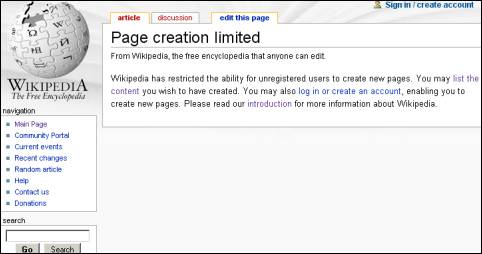Wednesday, December 7, 2005
Wikipedia Changes a Policy

Remeber the case of John Seigenthaler Sr., a journalist who in USA Today told he found the following entry on him on Wikipedia?
“John Seigenthaler Sr. was the assistant to Attorney General Robert Kennedy in the early 1960’s. For a brief time, he was thought to have been directly involved in the Kennedy assassinations of both John, and his brother, Bobby. Nothing was ever proven.”
This text wasn’t only on Wikipedia.org itself – it was also appearing on sites that copy Wikipedia’s free content. Well, Seigenthaler was understandably not amused, and caused some stir in mainstream media and blogs alike. The Seigenthaler article is now changed, and currently protected from further edits – and the malicious version is only visible to Wikipedia administrators. More importantly, due to this recent debate (and potentially, other debates of the same nature – just think of Daniel Brandt’s Wikipedia-Watch.org), Wikipedia has changed some of its policies. You can now no longer create new pages without registering first, as the New Scientist reports. Or if you try, this is what you’ll see:
“Wikipedia has restricted the ability for unregistered users to create new pages. You may list the content you wish to have created. You may also log in or create an account, enabling you to create new pages. Please read our introduction for more information about Wikipedia.”
Registering still keeps you anonymous, though, other than that you need to decide on a fictional user name. (I make it a point to include my real name and location on my user page, but that isn’t enforced in any way.) You don’t even have to hand out your email – that field is optional. So the best bet on finding out who this particular person at Wikipedia really is might still be to check for their IP, and if a court case exists, ask the Wikipedia organization for the actual time of the edit, and ask the ISP to find the name for that time and IP combination.
I don’t know how this solves the problem at large... even if it would prompt you to leave your real identity. Maybe it’s a political counter-move to silence specific parts of the discussion. I would say at any given time, the average correctness of all Wikipedia articles taken together is maybe 80%. That’s good already, but if you’re looking for factual perfection of higher degrees – maybe the 95% of a traditional encyclopedia, which is also much, much more limited in scope? – you can’t just fine-tune parts of the system. The whole idea is that on average, the quick edits by everyone give good results. Quick edits is exactly what the last fine-tuning is targeted against (in a very limited context here, so it won’t matter too much).
But the Wikipedia idea is not based on “get all the experts together,” because we don’t reach critical mass with that attitude... because those quick edits are also often quick corrections. While someone may not be an expert on a given subject, if the barrier is low and the spirit non-elitist that someone may still improve the subject, because he’s part of the larger (all taken together, wise) crowd.
When you are a researcher looking for information, Wikipedia in that respect is the information hamburger. You go eat and digest it fully aware of the fact it won’t be too healthy for you. But it does manage to make your hunger stop, and it’s cheaper too than most other food. Personally, I think it’s OK to eat a hamburger every now and then. You just have to now what you’re dealing with.
Also: NPR has an audio interview of both Seigenthaler and Jimmy Wales, Wikipedia founder.
[Via Jason Kottke, Gary Price.]
>> More posts
Advertisement
This site unofficially covers Google™ and more with some rights reserved. Join our forum!
